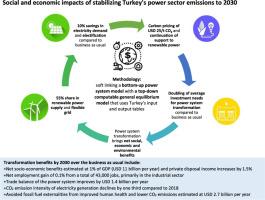Transforming Türkiye's power system: An assessment of economic, social, and external impacts of an energy transition by 2030
Abstract
Türkiye has the long-term goal of transforming its power system to one that is cleaner, more secure and more affordable. According to this paper's scenario analyses, low-cost renewables can supply 55% of Türkiye's total electricity demand. Coupled with the electrification of end-use sectors, energy efficiency can reduce total power demand by 10% compared to a business as usual scenario by 2030. The paper assesses the social, economic, and environmental impacts of this transformation by soft linking a power system model with an applied computable general equilibrium model, using an updated input and output dataset, and employing a novel analysis of job creation and fossil fuel externalities. The power system transformation significantly improves social welfare with net socioeconomic benefits estimated at 1% of GDP by 2030. Positive impacts include a reduction in human health and climate change externalities by a third, which are further enhanced by wage income growth that is driven by higher skilled and better paid jobs. A carbon tax emerges as a critical instrument to realize these benefits whilst reducing the power sector's emissions to 2030. The assessment should be expanded with more ambitious clean energy technology deployment for the entire energy system to operationalize Türkiye's Paris-aligned 2053 net-zero emission target and just transition policies.


 求助内容:
求助内容: 应助结果提醒方式:
应助结果提醒方式:


